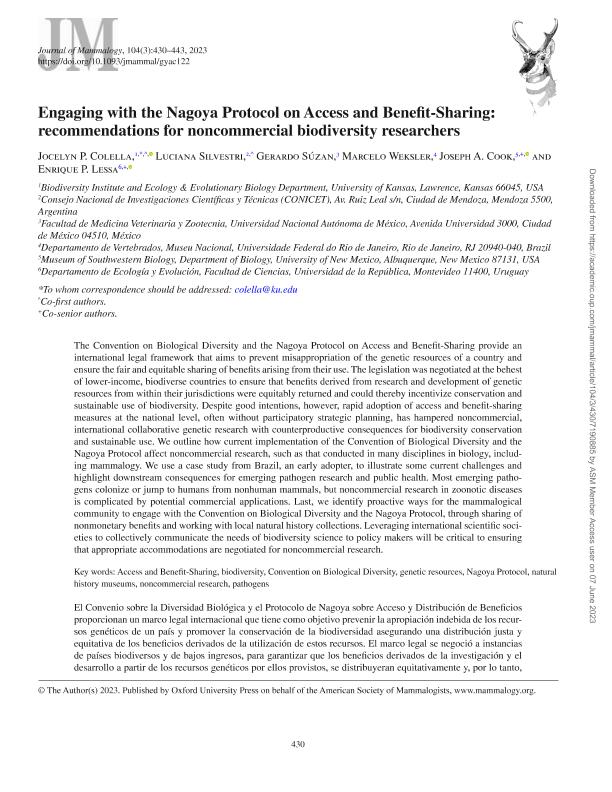Mostrar el registro sencillo del ítem
dc.contributor.author
Collela, Jocelyn P.
dc.contributor.author
Silvestri, Luciana Carla

dc.contributor.author
Suzan, Gerardo
dc.contributor.author
Weksler, Marcelo

dc.contributor.author
Cook, Joseph
dc.contributor.author
Lessa, Enrique P.

dc.date.available
2024-04-17T10:14:55Z
dc.date.issued
2023-06
dc.identifier.citation
Collela, Jocelyn P.; Silvestri, Luciana Carla; Suzan, Gerardo; Weksler, Marcelo; Cook, Joseph; et al.; Engaging with the Nagoya Protocol on Access and Benefit-Sharing: recommendations for noncommercial biodiversity researchers; Oxford University Press; Journal of Mammalogy; 104; 3; 6-2023; 430-443
dc.identifier.issn
0022-2372
dc.identifier.uri
http://hdl.handle.net/11336/233216
dc.description.abstract
The Convention on Biological Diversity and the Nagoya Protocol on Access and Benefit-Sharing provide an international legal framework that aims to prevent misappropriation of the genetic resources of a country and ensure the fair and equitable sharing of benefits arising from their use. The legislation was negotiated at the behest of lower-income, biodiverse countries to ensure that benefits derived from research and development of genetic resources from within their jurisdictions were equitably returned and could thereby incentivize conservation and sustainable use of biodiversity. Despite good intentions, however, rapid adoption of access and benefit-sharing measures at the national level, often without participatory strategic planning, has hampered noncommercial, international collaborative genetic research with counterproductive consequences for biodiversity conservation and sustainable use. We outline how current implementation of the Convention of Biological Diversity and the Nagoya Protocol affect noncommercial research, such as that conducted in many disciplines in biology, including mammalogy. We use a case study from Brazil, an early adopter, to illustrate some current challenges and highlight downstream consequences for emerging pathogen research and public health. Most emerging pathogens colonize or jump to humans from nonhuman mammals, but noncommercial research in zoonotic diseases is complicated by potential commercial applications. Last, we identify proactive ways for the mammalogical community to engage with the Convention on Biological Diversity and the Nagoya Protocol, through sharing of nonmonetary benefits and working with local natural history collections. Leveraging international scientific societies to collectively communicate the needs of biodiversity science to policy makers will be critical to ensuring that appropriate accommodations are negotiated for noncommercial research.
dc.format
application/pdf
dc.language.iso
eng
dc.publisher
Oxford University Press

dc.rights
info:eu-repo/semantics/openAccess
dc.rights.uri
https://creativecommons.org/licenses/by-nc-sa/2.5/ar/
dc.subject
ACCESS AND BENEFIT SHARING
dc.subject
BIODIVERSITY
dc.subject
CONVENTION ON BIOLOGICAL DIVERSITY
dc.subject
GENETIC RESOURCES
dc.subject
NAGOYA PROTOCOL
dc.subject
NATURAL HISTORY MUSEUMS
dc.subject
NON COMMERCIAL RESEARCH
dc.subject
PATHOGEANS
dc.subject.classification
Otras Derecho

dc.subject.classification
Derecho

dc.subject.classification
CIENCIAS SOCIALES

dc.title
Engaging with the Nagoya Protocol on Access and Benefit-Sharing: recommendations for noncommercial biodiversity researchers
dc.type
info:eu-repo/semantics/article
dc.type
info:ar-repo/semantics/artículo
dc.type
info:eu-repo/semantics/publishedVersion
dc.date.updated
2024-03-13T15:12:37Z
dc.journal.volume
104
dc.journal.number
3
dc.journal.pagination
430-443
dc.journal.pais
Estados Unidos

dc.journal.ciudad
Lawrence
dc.description.fil
Fil: Collela, Jocelyn P.. University of Kansas; Estados Unidos
dc.description.fil
Fil: Silvestri, Luciana Carla. Consejo Nacional de Investigaciones Científicas y Técnicas. Centro Científico Tecnológico Conicet - Mendoza. Instituto Argentino de Investigaciones de las Zonas Áridas. Provincia de Mendoza. Instituto Argentino de Investigaciones de las Zonas Áridas. Universidad Nacional de Cuyo. Instituto Argentino de Investigaciones de las Zonas Áridas; Argentina
dc.description.fil
Fil: Suzan, Gerardo. Universidad Nacional Autónoma de México; México
dc.description.fil
Fil: Weksler, Marcelo. Universidade Federal do Rio de Janeiro; Brasil
dc.description.fil
Fil: Cook, Joseph. University of New Mexico. Department of Biology; Estados Unidos
dc.description.fil
Fil: Lessa, Enrique P.. Universidad de la República. Facultad de Ciencias; Uruguay
dc.journal.title
Journal of Mammalogy

dc.relation.alternativeid
info:eu-repo/semantics/altIdentifier/doi/http://dx.doi.org/10.1093/jmammal/gyac122
Archivos asociados
